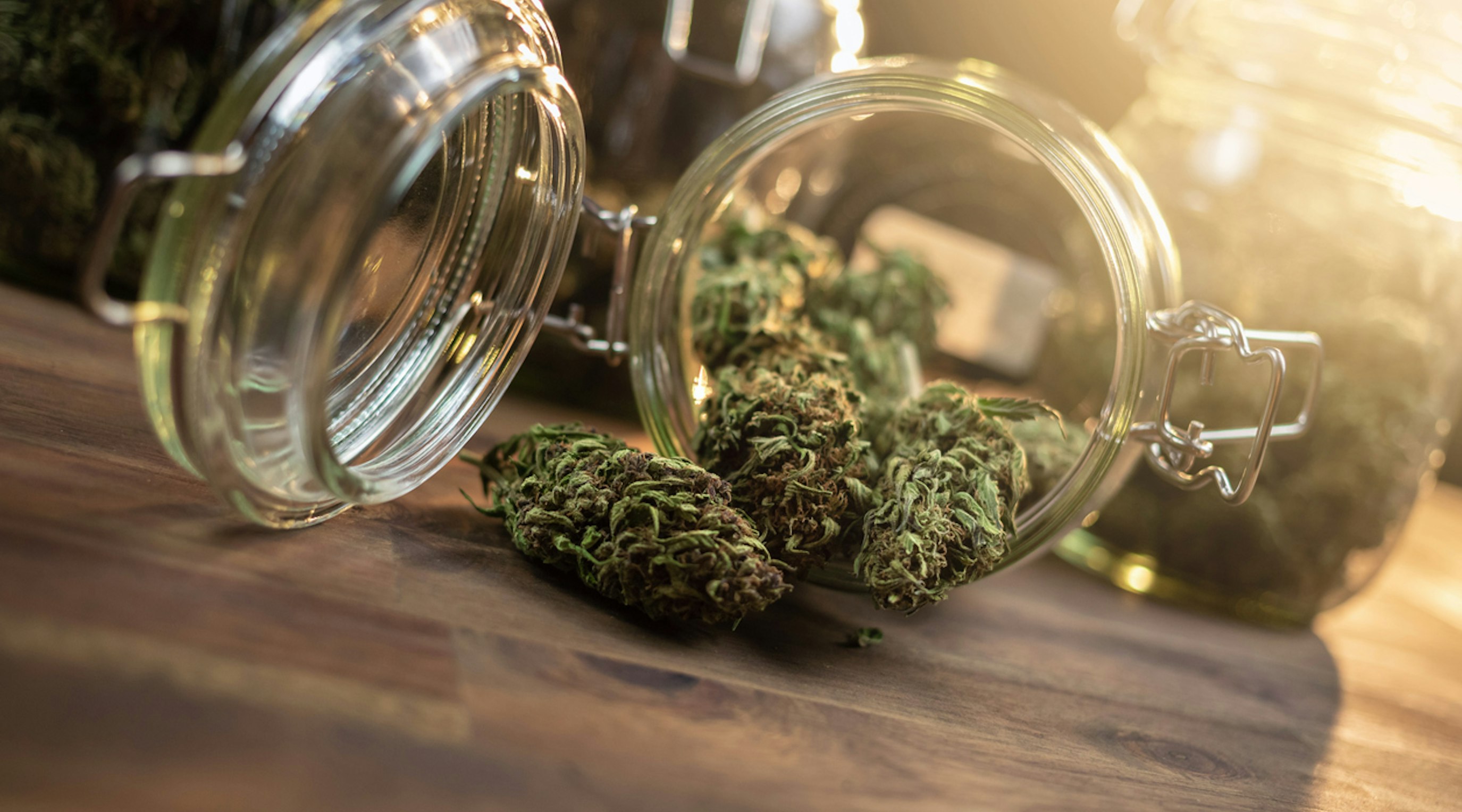Understanding the differences between CBD flower and medical cannabis cultivars
8 min read
Sarah Sinclair
CBD flower and medical cannabis cultivars are often conflated, but while they may look and smell similar, there are significant differences when it comes to their chemical composition, intended use, regulatory status, and effects.
CBD flower is illegal in the UK, while medical cannabis flower can only be prescribed by a specialist doctor, so it’s crucial to know your hemp from your high-THC cultivars.
We take a closer look at some of the key differences.
Contents
CBD flower: everything you need to know
What is CBD flower?
CBD (cannabidiol) is one of over 144 cannabinoids produced by the Cannabis sativa L. genus.
CBD flowers come from a variation of the plant which is bred to contain high levels of CBD and very low levels of THC, usually less than 0.2%.
What’s the difference between CBD and hemp?
Hemp refers to varieties of the Cannabis sativa plant that are grown for industrial and commercial purposes. By legal definition in many regions, hemp must contain less than 0.3% THC, and in the UK, less than 0.2%.
What are the effects of CBD flower?
Due to the low levels of THC, CBD flower does not produce any intoxicating effects. In other words, you won’t feel ‘high’ from it.
CBD does have a range of other therapeutic effects though, with many reporting its benefits for relieving anxiety, pain, and inflammation to name just a few.
Is CBD flower legal in the UK?
While CBD products are now sold widely on the high street and are legal in the UK as long as they contain less than 0.2% THC, CBD flower is still technically illegal. This is where it gets a little bit complicated.
Under The Misuse of Drugs Act 1971 cannabis and its derivatives are classed as controlled substances. This means that even if the THC content falls below the legal limit, the act of selling or possessing CBD flower is considered illegal because it falls under the definition of cannabis.
Retailers cannot legally sell CBD flower in the UK, and those looking to reap the potential wellness benefits should choose other products and modes of administration such as oils, tinctures, and edibles that meet the regulatory requirements.
The legality of CBD flower remains a controversial issue, not only in the UK but elsewhere in Europe. Regulations vary between jurisdictions but its use is largely prohibited, despite the widespread availability of other CBD products.
What is CBD flower used for?
CBD is commonly used for relieving anxiety, inflammation and pain, as well as many other symptoms and health conditions.
CBD now comes in many different forms, from oils and edibles to topicals. But some people prefer the delivery method of vaping flower due to its fast-acting effects, especially if it is to treat an acute symptom such as an anxiety attack or pain flare up.
Patients may also turn to CBD flower to help balance out some of the unwanted side-effects of THC. Some studies have shown it can help reduce THC-induced anxiety and paranoia.
Can I get CBD flower on prescription?
In the UK, medical cannabis flower products containing high levels of CBD and low THC are available on prescription to eligible patients, but only through a specialist doctor.
However, there are generally less high-CBD flower-based products available compared to those containing higher levels of THC, due to limited demand.
Medical cannabis cultivars: understanding the difference
What are medical cannabis cultivars?
Medical cannabis contains varying amounts of CBD and THC, depending on the cultivar. Some are THC-dominant, some CBD-dominant, and others have a balanced ratio of both.
Medical cannabis flowers also contain a whole spectrum of minor cannabinoids and terpenes too, which all contribute to the overall therapeutic effects. In some cases, the specific cannabinoid and terpene profiles may be tailored to treat different medical conditions.
What are their effects?
Due to the higher levels of THC in medical cannabis it can have psychoactive and intoxicating effects.
Beyond this, the effects of medical cannabis vary greatly depending on the cultivar and the levels of cannabinoids and terpenes it contains. Its effects also differ depending on the different modes of administration, for example whether it is inhaled through vaporisation or ingested as an oil and on the individual patient, as it is a very personalised treatment.
Potential side-effects
Like any medication, medical cannabis can also have side effects. These include dry mouth, dizziness, impaired memory, altered judgement, and, in some cases, anxiety or paranoia (primarily from the THC).
It can also interact with other medications, so it’s important for patients to consult with their clinician before considering it as a treatment.
Therapeutic effects of medical cannabis
Medical cannabis is now prescribed to treat various conditions, from chronic pain and inflammatory bowel disease, to anxiety and ADHD, due to its wide range of therapeutic effects.
So far, there is strong scientific evidence to support the use of medical cannabis for relieving nausea and vomiting, reducing seizures in severe forms of epilepsy and managing muscle spasticity in conditions such as multiple sclerosis (MS).
However, there are many more reported benefits and a growing evidence base for these too. This includes pain relieving, anti-inflammatory, anxiolytic and neuroprotective effects.
Real-world evidence from the UK and overseas also shows it can have positive effects on sleep and mood regulation, with antidepressant effects and often leads to improvements in quality of life.
What conditions is medical cannabis flower prescribed for in the UK?
In the UK, medical cannabis can be prescribed for almost any condition - as long deemed to be in the best interests of the patient and they have already tried two conventional treatments without success.
Some of the conditions for which it is commonly prescribed include:
- ADHD
- Alzheimer’s Disease
- Anxiety
- Arthritis
- Autism
- Cancer
- Chemotherapy-induced nausea and vomiting
- Chronic pain
- Chronic Inflammation
- Crohn’s Disease
- Ehlers-Danlos syndromes
- Endometriosis
- Epilepsy / Seizure management
- Fibromyalgia
- Irritable Bowel Syndrome (IBS)
- Migraines
- Multiple Sclerosis (MS)
- Neuropathic pain
- Parkinson's disease
- PTSD
- Sleep disorders
- Spasticity
- Tourette's syndrome
- Ulcerative Colitis
FAQs
Can CBD flower be Sativa or Indica?
Yes, although due to the low THC content, CBD flowers are rarely classified as either Indica or Sativa. This system of classification has been used for decades to help distinguish the different types of cannabis plants and their effects, but research is proving it to be somewhat outdated, even for medical cannabis cultivars.
How do I know if my flower has CBD?
Your specialist will explain the cannabinoid content of any cannabis-based medication you are prescribed. All medical cannabis products available to patients in the UK must come with a Certificate of Analysis (COA), which details the levels of CBD, THC, and other cannabinoids in the product.
If you're unsure, you can also ask your Releaf prescribing specialist to review the COA with you, so you’re fully informed about the CBD and THC content in your prescribed flower.
Is medical cannabis right for me?
Everyone responds differently to treatment with medical cannabis and due to the varying effects, it’s important to use it under the guidance of a specialist clinician.
If you have any of the conditions listed above or if you are interested in exploring this treatment, you can use Releaf’s free eligibility checker to determine if it's right for you.
A team of expert clinicians will then review your application and if appropriate you will be invited to schedule an appointment with a specialist consultant.
Find out more via the FAQs page or by contacting a member of the team.
Share article
Did you like this article?
It is important to seek medical advice before starting any new treatments. The patient advisors at Releaf are available to provide expert advice and support. Alternatively, click here to book a consultation with one of our specialist doctors.
Elevate your wellness with medical cannabis
Get comprehensive care, convenience, and confidence with an all-in-one treatment plan.
Am I eligible?Authors
Sarah, a distinguished journalist with over a decade in publishing and communications, now excels in cannabis health and policy journalism in the UK, advocating for informed health decisions through her award-winning work.
Editorial Policy
All of our articles are written by medical cannabis experts, guided by strict sourcing guidelines, and reference peer-reviewed studies and credible academic research. Our expert clinical team and compliance specialists provide valuable insights to ensure accuracy when required. Learn more in our editorial policy.
Need more help?










